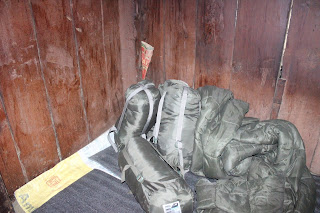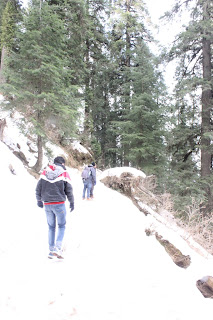 Monsoon lasted a little over three months in Daund – a small railway junction. Daund was a quaint little taluka which no one visited unless posted forcefully by the government. Daund, back in the 1920s was known to not many, but it sure did have all the salient features required for a countryside vacationing. It had lush green landscapes spread as far as the eyes could see, three tiny villages in the north mostly made up of bamboos and sticks covered with hay all around. There was a humble school, The Shalimar Certified High School, consisting of mere two rooms – in one room neat benches and desks were arranged and the other room the students were made to sit down on the floors covered with worn out rugs.
Monsoon lasted a little over three months in Daund – a small railway junction. Daund was a quaint little taluka which no one visited unless posted forcefully by the government. Daund, back in the 1920s was known to not many, but it sure did have all the salient features required for a countryside vacationing. It had lush green landscapes spread as far as the eyes could see, three tiny villages in the north mostly made up of bamboos and sticks covered with hay all around. There was a humble school, The Shalimar Certified High School, consisting of mere two rooms – in one room neat benches and desks were arranged and the other room the students were made to sit down on the floors covered with worn out rugs.
The two adjoining dilapidated rooms on the extreme east of the taluka were converted out to be The Shalimar Certified High School. There ran a pair of railway tracks cutting the whole taluka into two halves – North and South; only one train carrying coal would pass every afternoon steaming its dark smoke out whilst whistling thunderously to declare its arrival.
The south of the tracks was what Daund was famous for – The Railways’ Quarters. Those were built by the British way back in the second decade of the twentieth century. It was as if a golden necklace was put on the chest of the map of Daund. The quarters spanned from one corner to the other and was sorted systematically with allocations of bungalows and apartments, for the officers, neatly placed in the better end of the south zone and the humongous chawls for the labor class which constituted for eighty percent of the quarters. The only egalitarian thing about that colony were the walls – they were cobblestones embedded in mortar – and the cobbled streets giving out dark black against a green canvas.
In 1930, Richard Brown, the station master, was posted to Daund from Bombay as soon as he had arrived after his wedding from England to resume his duties along with his wife. One year later, Ricky came into existence. Richard worked harder and harder for the first three years so as to get a transfer to a better city or, even better, to England. But as luck had it, no such transfers came his way and he resorted to alcohol. As Daund was an emerging junction the British concentrated a strong youth force there.
Ricky grew among his Indian counterparts and a few fellows of his own kind – stuck in a brown land boring white color. Ricky often wondered why his last name wasn’t Andrews or Smith like the other kids or even Patil or Kulkarni like the Indian kids, but he had made peace with his name assuring himself of its temporary nature and that it would be changed once he flew back to England. When Ricky came of schooling age, he was naturally put into the only school available.
There were two nuns, from London, who took classes from grade 1 – 10 for all the white students and would take only English subject for the Indian students. Ricky was better than his Indian counterpart in English and would try to teach them and make them speak in it and in return, knowingly , unknowingly was learning their local language – Marathi.
As the years passed and Rick became a teenager, he had developed into a tall boy with a fluent British accent along with a fluent Marathi. He left Daund rather reluctantly and went to London to pursue his further studies, unlike his father who couldn’t afford to leave his job. Against his wishes, he was sent to London as his father had now started believing that once one is stuck in Daund, it will absorb one for the rest of his life in the lands of absolutely nothing and into the perpetual nothingness. The same shouldn’t happen with Ricky, so he was sent. Ricky thought otherwise.
Ricky grew up quickly and became an automobile engineer, took up a job, married a girl, had children and finally settled down in London. And thus the life went on.
It was 2000, the beginning of the third millennium, wasn’t so great for Ricky Brown. He was an early septuagenarian who had lost his parents and wife and his children weren’t living with him in his house. As the beginning of the new millennium drew closer he felt severe pain in his left shoulder and chest area whilst shopping for the New Year presents for his children in the market and collapsed. When he could make sense of things; he realized he was put into a hospital for a cardiac attack. As he looked around with his feeble vision, he could see his children and grandchildren around him. He looked past the shoulders of one of his grandchildren to notice a huge semi-transparent glass fitted window overlooking the green trees and lawn of the hospital.
He had been there for four days, after everyone had gone, with no nurses to bug him he rested himself in a chair so as to enjoy the outside view through the glass. London was pouring down heavily that afternoon. His old, tired eyes tried following the trickles of water and the patterns formed on the glass before they disappeared after following down. He tried keeping track of every drop until it reached down and he couldn’t bend his neck any further. Amidst doing this and the drenched greenery outside him, he went back to the green canvases of his Railways’ quarters.
Many questions came to his mind raising a big “If” in his journey down the memory lane. He cherished his old colony, especially in the monsoon. The big bungalow he grew up in. How he walked back home from his school along with his friends John Andrews and Ray Smith? He even wondered what they were doing in life or were they even alive. He remembered all those chawls he would cross to reach home from school. The crevices on the cobbled floor with running water and racing with them. He remembered the scent of Daund and suddenly remembered his parents’ faces. ‘God! Dad was so huge and mom so delicate.’ His marriage was the only occasion that his parents visited him and the last time he ever saw them. He hated himself for not even making time to go to their funerals. Why did he not ask them to move in with him in his London apartment?
He remembered about Mahesh, Ravi, and Rohit whom he taught English and learnt their language. They were his only Indian friends. There were times all five of them would cross the tracks or run along the tracks or play with the stones kept between the tracks. The long wait with berries and mangoes in hands waiting for the only locomotive that passed there and chasing it at full speed until the legs gave in.
There stood a small shop across the tracks in desolation. This shop when looked closely was a shop-cum-house with a counter in front and a bed for one at the rear. There lived Ramu kaka who would only appear smoking bidis. The villagers called him fool and a dangerous man so no child ever dared to go and talk to him. Even Rick and his friends would keep a safe distance. Whenever they used to wait for long hours for the locomotive to pass steaming gas out, Rick would always wonder about why Ramu kaka kept the shop so far from the main market? Why did he live alone? It suddenly struck him that he didn’t even know what did he sell; never did he enquire. Most of all he was answerless of the fact that why everyone was so scared of him and why in the world did he smoke so many bidis? ‘If only I had been more of a conversation striker I would have known him well.’
Ricked cursed himself for being an introvert and today was the day of all he wished he were more of an extrovert. Had he been an extrovert then, he wondered, he would have mingled with so many families who were local there. Taken part in local festivals, which nevertheless he did, but just with more sense of understanding. He would have also mingled with other Christian British families and maybe had been better friends with Mary, his childhood neighbor, and classmate. Suddenly, he remembered a dove like face, fairer than the usual, something cleaner from the lot present but not white – Sandhya.
Dusk had set in, a knock on the door broke Ricky’s reverie and as he turned around wiping off his tears he saw his two sweet grandchildren through the glass of the door. Insinuating them to come inside he said ‘Aat ya.’ The bewildered children asked, 'What?'
‘Ah! Marathi. I knew it! You are still there somewhere in me even when all left me or I left them.’ Ricky murmured to himself and laughed loudly with more tears rolling down his eyes.
Eventually, Ricky Brown died a brown dead, apparently, his last name never wore off.

















